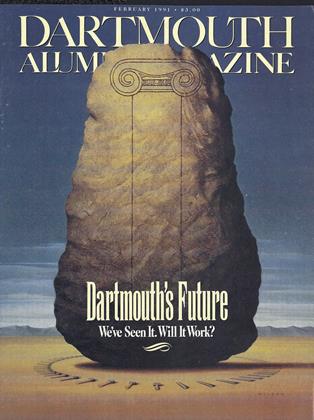Alumni foreign affairs experts share their views.
THIS IS THE FIRST AND, WE SINCERELY hope, the last time you will see a picture of an Iraqi dictator in the Class Notes section of this magazine. But before the January 16 airstrike our Washington correspondent, The New Republic's senior editor/ Dartmouth Class Notes columnist Morton Kondracke '60, called classmates who are expert in Middle Eastern and foreign affairs, and asked them what they thought about events in the Gulf. Here are some of their answers, given in late November. You'll find more in the '60 column.
• Paul Boeker, former U.S. ambassador to Jordan, is opposed to war against Iraq. He said combat would cost "tens of thousands of casualties," would break up the international coalition the United States has assembled against Iraq, and would "insert the United States into a process we can't control the disintegration of the old order in the Arab world," eventually bringing down both kingdoms and totalitarian dictatorships. Paul thinks President Bush did the right thing sending troops to the Gulf, however. The president ought to keep them there until Saddam Hussein gets his army out of Kuwait, which Paul says could happen in less than a year.
• Robert Peck, former principal deputy assistant secretary of State for the Near East, said a U.S. attack on Iraq will trigger revolutions that could topple pro-American Arab regimes and install anti-American radicals. Bob said he thought Bush acted too hastily in sending troops, but he was pleasantly surprised when other nations supported the president. Now, Bob favors a negotiated settlement giving Iraq two disputed islands that provide an outlet to the sea.
• Denny Goodman, former principal deputy assistant secretary of State in charge of international organizations, said he thought President Bush should have used threats, rather than troops, to keep Iraq out of Saudi Arabia. Denny hoped Bush would use airpower, not ground forces, if war was necessary.
• Retired Army Colonel LewCressler, a former military intelligence commander and Vietnam veteran, seemed the most enthusiastic about Bush policy. "It's absolutely essential to western civilization that we not allow Saddam Hussein to control 60 percent of the world's oil," he said. "If we can't get this done any other way, we have to use force."
Is Saddam calling the U.S. to arms?
 View Full Issue
View Full Issue
More From This Issue
-
 Feature
FeatureThe End of The Story
February 1991 By Dan Nelson '75 -
 Feature
FeatureZ-Man Covers The War
February 1991 By Robert Eshman '82 -
 Feature
FeatureOUR PASSIONATE PREFERENCE
February 1991 By Joseph D. Mathewson '55 -
 Cover Story
Cover StoryNow For The Hard Part
February 1991 By Jay Heinrichs -
 Feature
FeatureWHO OWNS DARTMOUTH?
February 1991 By Joe Boldt '32 -
 Feature
FeatureIs Harvard Becoming More Like Dartmouth?
February 1991







